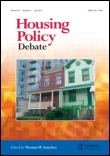Description
Publication by DPDF 2007 “The Political Economy of Redistribution” Fellow Rachel Meltzer
Homeowners associations (HOAs) have become one of the most popular housing options, offering residents supplemental services, amenities, as well as exclusivity and protection. HOAs are touted for their potential to improve the match between household preferences and local services, but denounced for, among other things, their tendency to facilitate residential segregation. Yet, despite growing claims, these propositions have not been rigorously tested. The expectation is that if households do sort into HOAs based on income or race/ethnicity, then these associations can affect segregation by encouraging exclusive and homogeneous living environments. However, HOAs may actually offer a unique vehicle for racial and/or economic mixing or, at the other extreme, they may not influence segregation if residents do not rely on HOAs to sort along racial or economic lines. Unlike previous studies, the current analysis observes jurisdictions over multiple decades in an attempt to better identify whether the growth in HOAs is driving changes in segregation. Using a unique, longitudinal database of HOAs in Florida and multiple measures of segregation, this article tests the effect of HOAs on jurisdiction racial/ethnic and economic segregation. Results from both ordinary least squares and instrumental variable regressions indicate that an increase in HOA presence exacerbates black–white and Hispanic–white residential segregation. Any segregation, however, is tempered by the concentration of HOA units in larger communities. On the contrary, there is no significant effect on income segregation; this suggests that HOAs do not intensify existing tendencies toward income sorting.

